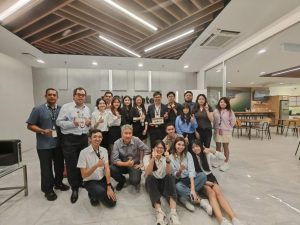A new initiative is helping reduce plastic waste in Malaysia. The Ikat Tepi EP (Employer Project), led by Ang Wei Zhi and Muhammad Rajaie Mustafar, lecturers at INTI International College Penang’s (IICP) School of Business (SOBIZ), focuses on cutting down the use of raffia string—an everyday plastic often used in food packaging but harmful to the environment.
Supported by Clarivate Penang, the project involves students from the Bachelor of Arts (Hons) in Event Management and Marketing (BEVUH) and Diploma in Marketing (DMKT) programmes. The initiative encourages simple and practical ways to reduce plastic waste by combining research, corporate responsibility, and community work.
Addressing Plastic Waste at Hawker Stalls
Raffia string is commonly used at hawker stalls to tie up takeaway food and drinks. However, it is non-biodegradable and is often thrown away after a single use, adding to plastic pollution. The Ikat Tepi EP aims to change this by reducing raffia string use, educating people on its impact, and promoting reusable alternatives.
The project started with research to understand how much raffia string is being used and how it is disposed of. Surveys and interviews showed that many hawkers rely on raffia strings but do not have proper disposal methods. In response, the team introduced a simple solution—installing hooks at hawker stalls so customers can return raffia strings for reuse. This allows vendors to collect and reuse them, reducing waste.
With positive feedback from hawkers and customers, the project is now expanding. The team plans to roll it out nationwide, involve more businesses and NGOs, and run public awareness campaigns to encourage more people to adopt this practice.
“We want to change mindsets and offer practical solutions,” said Ang Wei Zhi, project leader and lecturer at SOBIZ. “Even small actions, like reusing raffia strings, can make a big difference if enough people participate.”

Students and lecturers from INTI International College Penang, along with Shaun Lee, Country Site Leader at Clarivate Penang, and the Clarivate senior management team, after a briefing session. The session emphasised sustainability and corporate-academic collaboration.
Partnerships for Sustainability
Collaboration between academia and industry has been key to this project. Clarivate Penang has provided support, expertise, and resources to help the initiative succeed.
“Sustainability isn’t just an idea—it requires action,” said Shaun Lee, Country Site Leader of Clarivate Penang. “By backing this initiative, we’re helping develop future leaders who are conscious of their environmental impact.”
For students, Ikat Tepi EP has been a hands-on learning experience. It has helped them understand sustainability issues and how small changes can significantly impact them.
“I never realised how much plastic waste raffia string creates until I saw it pile up daily,” said Lim Yong Jie, an IICP student. “This project opened my eyes.”
Khaw Ru Ting shared a similar view. “At first, hawkers were unsure about the idea, but once they saw how easy it was to reuse raffia strings, they started doing it. It showed me that simple solutions can work.”
Felicia Yeap Sue Lin emphasised that awareness alone is not enough. “People need easy and practical solutions. The hook system is simple and cost-effective. If more hawkers use it, we can make a real difference.”

INTI International College Penang students presenting findings from their hawker stall interviews at Clarivate Penang. The study examines raffia string use in food packaging and the need for sustainable alternatives.
A Step Toward a Greener Future
The Ikat Tepi EP supports the United Nations Sustainable Development Goals (SDGs), particularly SDG 12 (Responsible Consumption & Production) and SDG 13 (Climate Action). By reducing plastic waste and promoting reusable materials, the project contributes to a more sustainable future.
“At INTI, we focus on real-world learning, and this initiative is a great example,” said Hemalatha Murugiah, Chief Executive of INTI International College Penang. “It gives students hands-on experience while also helping the community.”
With growing support and awareness, the project is paving the way for wider adoption. The team welcomes businesses, NGOs, and individuals to join in and help create a cleaner, more sustainable Malaysia.